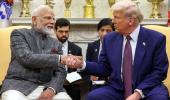'But I don't think the government is in a great hurry to sign the BTA.'

Ashwani Mahajan, a professor of economics at Delhi University and national co-convenor of the Swadeshi Jagran Manch, an economic think-tank affiliated with the Rashtriya Swayamsevak Sangh, tells Indivjal Dhasmana and Archis Mohan/Business Standard that he believes the government would heed the SJM's concerns about protecting the interests of India's agriculture, farmers, dairy, and small-scale industries before signing the Bilateral Trade Agreement (BTA) with the US.
How does the SJM view the proposed India-US Bilateral Trade Agreement?
When the World Trade Organisation agreements were being inked, even then, the SJM believed that instead of multilateral agreements, we should pursue bilateral agreements.
We were against multilateral agreements like the WTO for various reasons, including TRIPS (Trade-Related Aspects of Intellectual Property Rights), TRIMS (Trade-Related Investment Measures), and agreements on services and agriculture, as they endangered public health, farmers' welfare, and our sovereign right to make laws.
Also, under multilateral agreements, we were required to grant MFN (most favoured nation) status even to countries with which we had no trade or did not wish to trade, such as Pakistan.
We have argued that bilateral agreements are preferable because two countries can sit together and strike mutually beneficial deals.
We also do not subscribe to the notion that we must replicate each bilateral deal with others.
Our competent officers have and will continue to negotiate each deal threadbare.
For example, we inked a bilateral agreement with Australia instead of getting into the Regional Comprehensive Economic Partnership (RCEP).
We have also signed free-trade agreements (FTAs) with countries such as the United Arab Emirates and earlier with Japan and South Korea, although those were not good agreements.
In the case of the US and its threat to impose retaliatory tariffs, what should be our stand?
There are two sets of countries. One set of countries is those that are not ready to talk to the US, like China and some others, and another set of countries is engaging with the US for various reasons -- geopolitical, geo-economic, it could be anything.
India is one of those countries that is engaging with the US. Now the question is whether India would succumb to the pressures.
What I feel is that when you are engaging, that doesn't mean that you are going to succumb to their pressures.
This could also be a wait-and-watch approach -- seeing what they are going to do and what challenges they are going to face in their own country.
Since the US has announced the imposition of reciprocal tariffs, their markets are down, and there are fears that inflation will increase.
But if they do go ahead with this, and India is able to manage the situation while protecting its domestic interests, then many more opportunities will open for us.
For example, if we reduce tariffs on motorcycles, it's not going to make any difference to our motorcycle industry because the motorcycles coming from the US will be so costly, while ours are inexpensive.
Second, the prices of their electric cars start from Rs 45 lakh to Rs 50 lakh, while the best of our electric cars are available for Rs 17 lakh to Rs 18 lakh in India.
So there is a big difference. We are already cost-effective.
I've heard that the Government of India is already working very hard, discussing things internally on how to deal with this situation.
But we feel that engaging is a better strategy while protecting the national interest.
What are your red lines?
Our major concern is our agriculture, dairy, and small-scale industries.
The government is already sensitised to these issues.
If history is any guide and if the track record is any guide, the RCEP debacle was basically because of dairy and agriculture.
There was no other reason, although our industry was also opposed to it, but the RCEP's basic opposition from the masses was because of dairy.
Therefore, the government's track record shows that even the Australian FTA was signed without agriculture being included.
We feel engaging with the US is important, but I don't think the government is in a great hurry to sign the BTA.
Everybody is saying it will be signed sometime in December, and that is crucial because then we will have time on our hands.
But their strategy is MAGA (Make America Great Again) and our strategy is Atmanirbhar Bharat. Do you think there could be any complementarity there?
What I feel is that we are not just dealing with the US. The whole world is getting disrupted. Look at how the Europeans are willing to do technology transfers in defence with us.
There is another aspect, a long-term one, to this disruption.
The bigger picture is that the WTO is finished; its implications would be that TRIPS will be gone.
A substantial share of their GDP comes from the royalties and technical fees they earn.
What I am trying to say is that we should look at the opportunities, and the government might already be doing so.
But what is evident is that there will be opportunities for us, including in Europe, especially because they are now wary of China.
The SJM was at the forefront of opposing the WTO agreement, the land acquisition amendment Bill, and more recently the RCEP.
Do you think there is a need for a similar movement to protect India's farmers and the dairy industry?
At that time (during the WTO negotiations), we had put in the effort (of launching a movement) because the government was not heeding our concerns.
Today, if the government speaks the same language, with the same content, then what will we say on the road -- that we are fighting against the government?
Moreover, we are not a political party that might launch a movement without any reason.
We are a responsible think-tank and a movement. Also, SJM is one of the few organisations in the country that is talking about protecting our farmers' interests.
Not even the Opposition has issued any statement on this.
Having said that, I think voices should come from all sides, including from the Opposition, which should put forth constructive suggestions -- saying, for example, that the government is going to deal with the US but should try to protect certain sectors.
Feature Presentation: Aslam Hunani/Rediff.com












 © 2025
© 2025